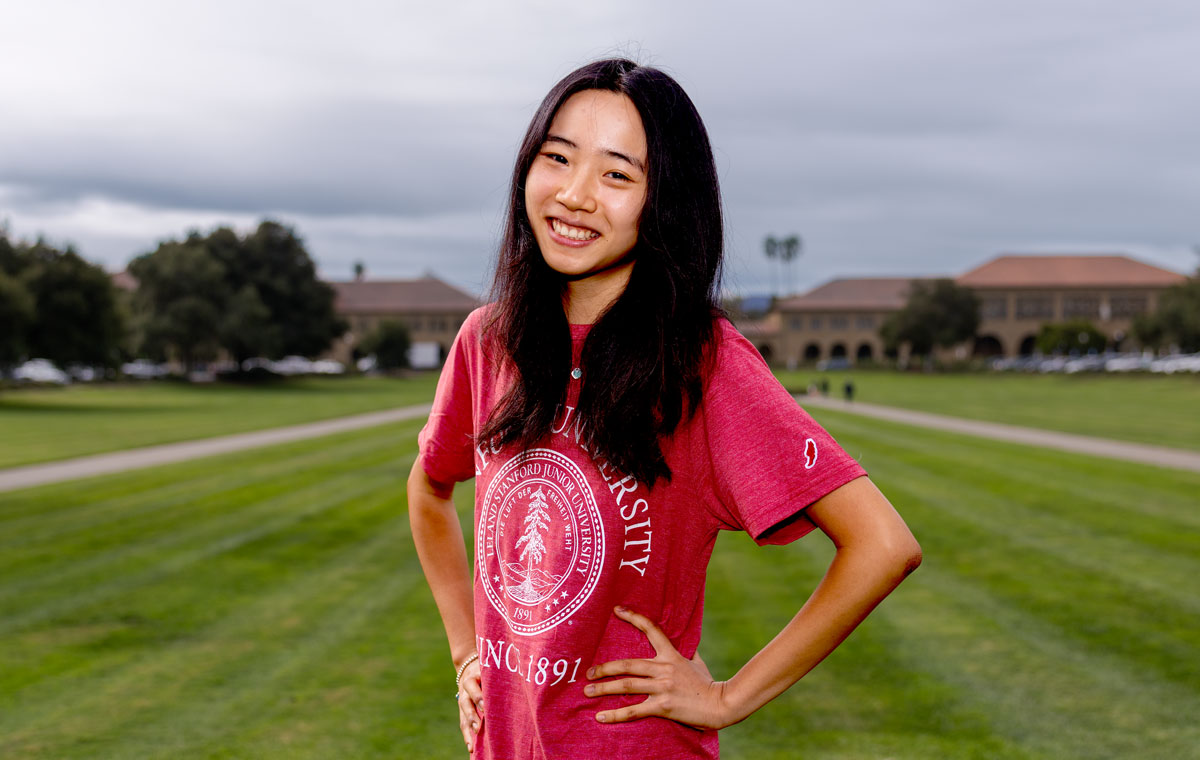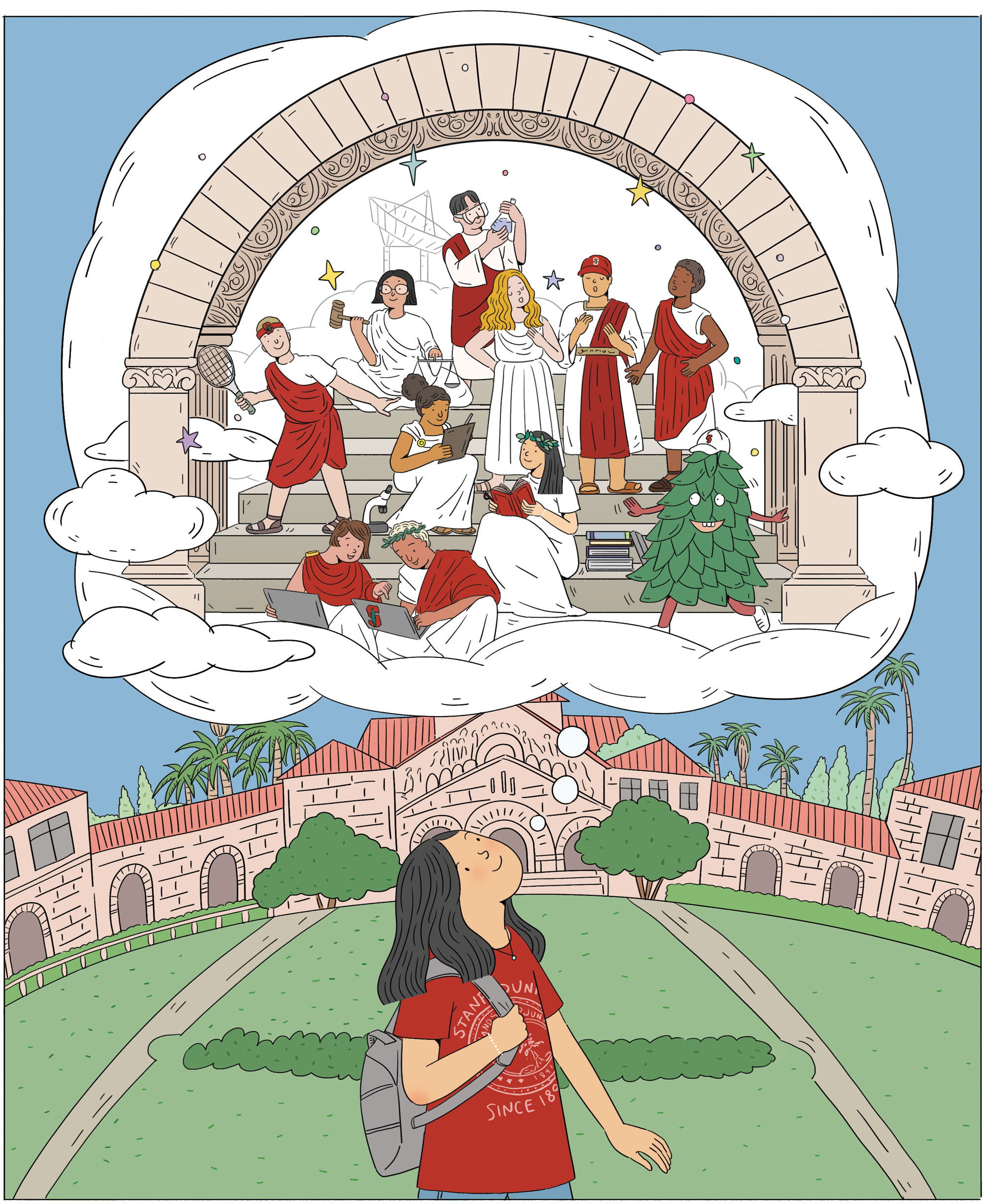I’ve always been a sucker for heroes.
In elementary school, I devoured the Percy Jackson series and The Complete World of Greek Mythology. Nothing captivated me more than Bellerophon bringing Pegasus to heel, or Prometheus nicking fire from the gods. I memorized the nine Muses, the difference between nectar and ambrosia. I recounted obscure mythology to anyone who’d listen. Fun fact: My California hometown of Arcadia bears the same name as the huntress Atalanta’s birthplace.
But I thought becoming a hero was impossible—that is, until I got into Stanford.
For a school that isn’t even 150 years old, the Farm feels pretty legendary. We have historic landmarks (Memorial Church), traditions from antiquity (Full Moon on the Quad), an endless stream of devout pilgrims (Athenians scaled rocky bluffs to reach the Parthenon. Today’s tourists Zipcar down Palm Drive).
But in my opinion, it’s the demigods that lend the university its allure: Stanford’s half-divine, half-mortal student body, its dropouts and stopouts and alumni. Ancient foot soldiers aspired to be the invincible Achilles. Here, students worship the likes of Yahoo co-founder Jerry Yang, ’90, MS ’90.
Finally, I thought when New Student Orientation arrived, finally, the chance to live out something truly mythic.
I couldn’t wait for 20 years from now, when I would pull up the “List of Stanford University alumni” Wikipedia page, point to my name—squished under “Literature” or “Entertainment,” riiiight there, do you see it?—and proudly say that I, too, had become a Stanford legend.
There were, of course, certain narratives I aimed to avoid. I didn’t want to be a “paddling duck,” barely afloat on the roiling Aegean. Compared with my anxious, introverted high school self, the Chloe of early freshman year was pleasantly unrecognizable. I savored my first quarter like I’d been advised to. Hiked the Dish with friends. Binged America’s Got Talent without remorse. Slept in on weekends. Felt happier than ever.
But here’s the problem with Stanford’s heroes: Their origin stories are deceptively casual. The poets say Yang met co-founder David Filo, MS ’90, in a computer architecture class, where, serendipitously, Filo served as Yang’s teaching assistant. And I was equally vulnerable to a good story at 18 as I had been at 8. Enamored with the thought of global conglomerates forming over CoHo pastries, social revolutions stirring in Roble Hall, I fully believed that at Stanford, great things just happen. All I had to do was wait, and I’d get mine.
Yet weeks passed. My own plot stayed stagnant. I feared something was dreadfully wrong. When would Arrillaga Dining’s crispy basa fish inspire me to write an Oscar-winning screenplay? When would that awkward Psych 1 friendship culminate in a Time magazine co-feature? My Stanford experience wasn’t living up to all the legends. It wasn’t even comparable to my friends’. I kept hearing iterations of the same dialogue: “Math 51 is killing me.” “Yesterday was my 20th all-nighter.”
So whenever I’m deciding between daily joy and the grind, between dessert night with my friends and another hour in Green Library, I think of the Stanfords and their lost son. I choose boba.
“Same here!” A blatant lie. I was a carefree nymph surrounded by diligent Spartans—peers who balanced 22-unit courseloads with coffee chats. Come to think of it, why didn’t I feel like an imposter? Were my standards too forgiving? Why hadn’t duck syndrome set in? Was I indulging too liberally?
This whole hero thing . . . maybe I was going about it all wrong.
So I started to rewrite my story. I dropped the reality TV habit (far too strong a source of dopamine). Started declining outings to the ice rink (it doesn’t even snow here—total waste of time!). I dedicated myself to recopying my lecture notes, an endeavor that didn’t improve my grades but felt diligent. I swapped sunset picnics at the Oval for hours spent doomscrolling LinkedIn profiles, comparing myself mercilessly with my peers. I confused masochism for enlightenment. If I was unhappy, that meant I was doing something right. Greatness couldn’t be expected but earned. Hercules’ Twelve Labors were labors for a reason.
Oracle, if you tell my tale, please omit my foolishness for future freshmen. I am guilty of creating academic misery, social comparison, and hardship where none existed. Worse, I’m guilty of reveling in it.
Here’s the problem with Stanford’s heroes: They all have compelling motivations. Take Google’s founders, Larry Page, MS ’98, and Sergey Brin, MS ’95, who yearned to “organize the world’s information.” So it’s ironic that in questing to join their ranks, I shapeshifted into the most directionless version of myself. I realized I was headed down the wrong path a couple months ago, when Mom called and asked, “Written anything lately?”
I hadn’t. Wasn’t that strange? I’d always thought of myself as a storyteller. It’s how I portrayed myself in cover letters and college applications. Just months prior, I’d been dreaming of real goals. Of producing earth-shaking investigative journalism. Evocative poetry collections. Now I wanted . . . what did I want?
I’d sabotaged my uniqueness to become a stereotypical Stanford striver. I wasn’t even a noble archetype—just an overwritten cliché.
I know essays are supposed to have proper endings. But since I’m a sophomore, half the page remains blank. That’s a good thing. It means the plot’s still mine to control. Whenever I question my trajectory at Stanford, I try to remember two things.
The first, ironically enough, is a chapter from Stanford’s own mythology. Did you know that after perishing from typhoid, Leland Stanford Jr. visited his father in a dream? Father, the boy’s ghost said. Do not say you have nothing to live for. You have a great deal to live for. Live for humanity.
 Photo: Erin Attkisson
Photo: Erin Attkisson
His words inspired the Stanfords to found the university. And though Jane and Leland Sr. are Stanford’s highest deities, Zeus and Hera of the Bay, theirs is the rare Stanford myth I can relate to—proof that achievement isn’t everything. Live for humanity. Try conceiving a higher calling than that. By founding the university that performed the first U.S. heart transplant, that has educated more than 320,000 people, one could say it’s an ambition Leland Sr. fulfilled. Still, given a choice between being a patriarch of higher education and being a father, might he have picked a happy life with his child—even if it meant no one remembered his name?
So whenever I’m deciding between daily joy and the grind, between dessert night with my friends and another hour in Green Library, I think of the Stanfords and their lost son. I choose boba.
I also think of Admit Weekend 2024. Susan Rice (literal U.S. Ambassador to the United Nations Susan Rice, ’86) had just argued her case for why prospective freshmen should choose Stanford. The Band was putting on a final show, which my memory retains as a cardinal-tinted miasma: brass and woodwinds glinting in the sunlight, Dollies twirling to “Footloose,” the Tree’s turquoise leaves thrashing maniacally. An esteemed speaker followed by an exuberant display—it was so quintessentially Stanford. The legend of Nerd Nation come to life.
It was also a contrast to hours before, when I’d taken a 3 a.m. bike ride with my Room Host and her friends, cycling uphill towards the Student Observatory. Despite it being late April, the night was black and cold. It verged, dare I say, on something less than Elysium. But we counted the stars on Orion’s Belt. Basked in the glow of Cassiopeia. And it was that moment—not the next day’s pomp and circumstance—that made me think, I could stay here forever.
We were Stanford students doing something as common as stargazing. And we were happy. We were fine. Which isn’t to say I’ll stop striving. I’ll always want to make something of my life. But scratch that Wikipedia page. Twenty years from now, I’ll be proud if I can say that at Stanford, I realized I don’t need to be a demigod. Stanford has plenty of legends. If I find myself among them, little Chloe would surely be pleased. But by the time I graduate, I want to be at peace with however my arc is unfolding—even if it’s considered unremarkable, or renders me a background character in an illustrious classmate’s life.
Because maybe that hill will remain the only Olympus I ever summit. And maybe it isn’t the glorious expanse of the universe—but Palo Alto at night is still a beautiful view.
Chloe Shannon Wong, ’28, is a former editorial intern at Stanford. Email her at stanford.magazine@stanford.edu.



